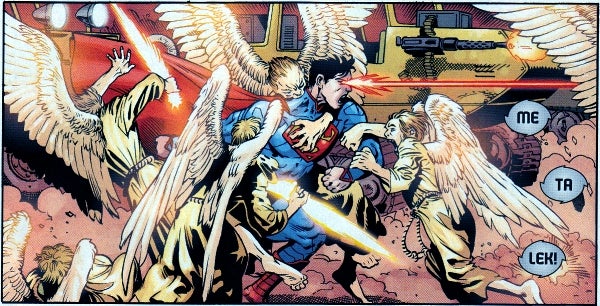Within the annals of the Justice League’s expansive roster lies one of its most enigmatic members: Zauriel, the angel of the 1990s whose story has often been overshadowed by more prominent characters. However, in a surprising turn of events, DC Comics unveils Zauriel’s whereabouts since the Rebirth event, ushering in a narrative shift that promises to redefine storytelling within the DC Universe.
“Outsiders #6,” penned by Jackson Lanzing, Collin Kelly, and Robert Carey, catapults readers into a realm beyond imagination as the team’s multiverse experiment spirals out of control, propelling them into “the Place Between the Pages.” Here, within a pocket reality where DC’s characters reside between publications, Zauriel emerges as a humble yet pivotal figure, forever altering the landscape of DC’s storytelling.
Zauriel’s reintroduction marks a long-awaited return for a character steeped in complexity and intrigue. Originally introduced in “JLA #6,” Zauriel’s journey from heavenly guardian to reluctant mortal ally captured readers’ imaginations, culminating in his formal induction into the Justice League as its resident expert on the supernatural. Crafted by luminaries such as Grant Morrison, Mark Millar, Howard Porter, and John Dell, Zauriel emerged as a beacon of mysticism and strength within the Justice League’s ranks.
Possessing superhuman abilities and celestial weaponry forged in the fires of heaven, Zauriel epitomizes the dichotomy between divine duty and mortal existence. Yet, his presence within the DC Universe poses a unique set of challenges, particularly concerning the integration of angelic lore within DC’s cosmic hierarchy.
On a macroscopic level, the inclusion of angels and heavenly realms disrupts the delicate balance of DC’s cosmic order, introducing theological quandaries that challenge established mythologies. Moreover, the presence of moral absolutes inherent in angelic characters complicates narrative exploration, as their divine sanction implies a predetermined moral righteousness that stifles nuanced character development.
However, Zauriel’s relegation to the “Place Between the Pages” offers a creative solution to these narrative dilemmas, affording him a space to thrive outside the constraints of traditional storytelling paradigms. Positioned as a custodian of this liminal realm, Zauriel symbolizes DC’s willingness to embrace the uncharted territories of its narrative landscape, paving the way for stories that defy convention and transcend conventional boundaries.
FAQs
Who is Zauriel, and why is his return significant in “Outsiders #6”?
Zauriel is a character introduced in “JLA #6” as an angel who forsakes his heavenly duties to aid the Justice League. His return in “Outsiders #6” marks a significant development in DC Universe storytelling, as it introduces a new narrative dimension within the “Place Between the Pages.”
What is the “Place Between the Pages,” and how does it impact DC’s storytelling?
The “Place Between the Pages” is a pocket reality where DC’s characters reside between publications. Its introduction opens up new storytelling avenues, allowing for the exploration of forgotten characters and overlooked narratives.
What challenges does Zauriel’s presence pose to the DC Universe’s cosmic hierarchy?
Zauriel’s status as an angel introduces theological complexities and moral absolutes that challenge established mythologies within the DC Universe. His integration into the narrative landscape requires careful consideration of these implications.
How does Zauriel’s relegation to the “Place Between the Pages” address these challenges?
By placing Zauriel in the “Place Between the Pages,” DC Comics provides a creative solution to the narrative dilemmas posed by his character. This liminal realm offers a space for Zauriel to thrive outside traditional storytelling paradigms, fostering innovation and exploration within the DC Universe.
